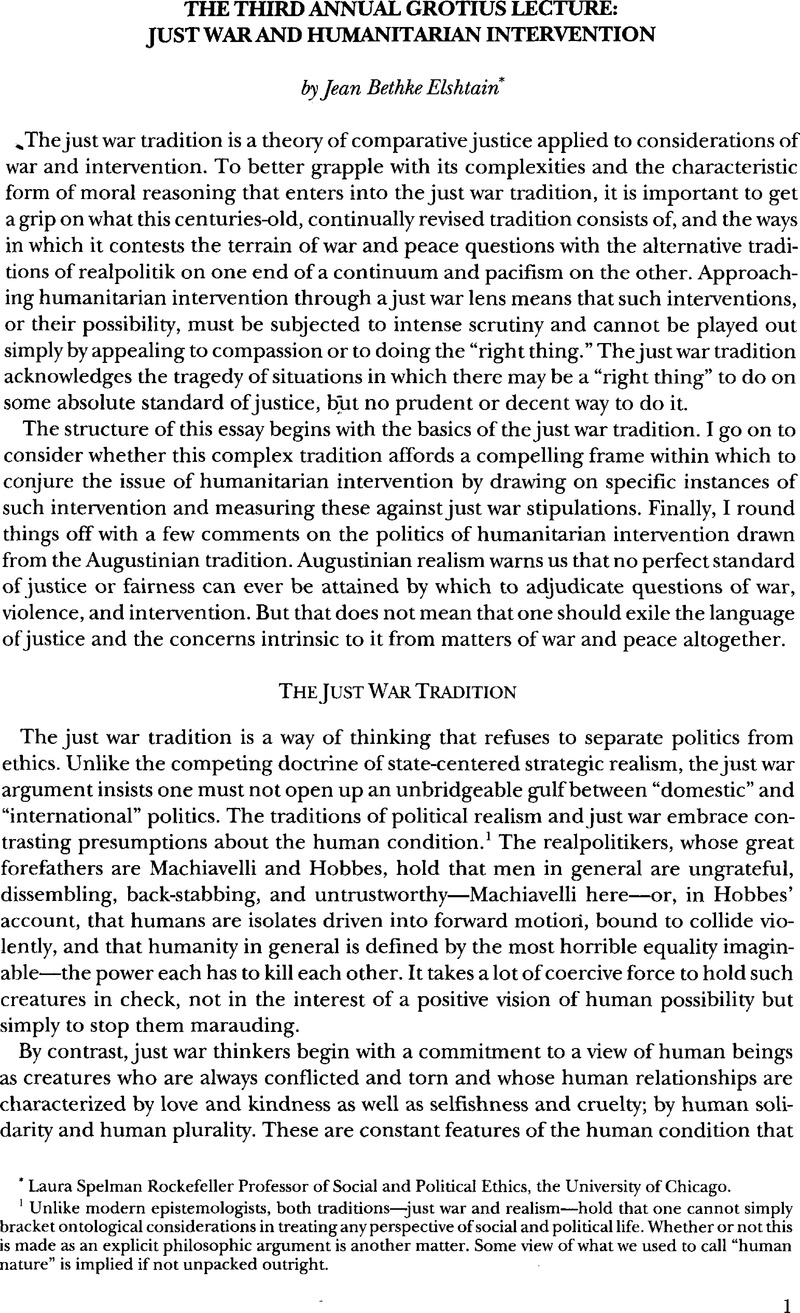Published online by Cambridge University Press: 28 February 2017

1 Unlike modern epistemologists, both traditions—just war and realism—hold that one cannot simply bracket ontological considerations in treating any perspective of social and political life. Whether or not this is made as an explicit philosophic argument is another matter. Some view of what we used to call “human nature” is implied if not unpacked outright.
2 This is another way in which the just war tradition guards against moral triumphalism: by insisting that even though the balance of justice may fall more on one side than the other in cases of conflict, there should be no presumption that the aggressor is wholly evil and that the aggressed against is wholly innocent. Presuppositions of total innocence can and have fueled horrible things.
3 Steven Lee Myers, Chinese Embassy Bombing: A Wide Net of Blame, N.Y. Times, Apr. 17, 2000, at a I.
4 Vann, Gerald, Editorial, Intervention: When and How , 126 Commonweal 5 (1999)Google Scholar.
5 There are so many critical questions to ask about this intervention. One worry, voiced by a number of critics, is whether this ostensibly new “universal dispensation can only apply to Serbia and a mere handful of other states that meet very exacting requirements: they must be sufficiently weak to be easily defeated, yet sufficiently advanced to present worthwhile targets for no-casualty bombardment.... Further they must be sufficiently illiberal to perpetrate outright massacres, yet sufficiently semi-democratic to capitulate when the mostly bloodless bombing of electrical supplies and other targets evokes the protests of inconvenienced citizens ... ” This from Edward N. Luttwack, No-Score War, Times Literary Supplement, July 14,2000, at 112. Luttwack adds: “What does it mean for the morality of a supposedly moral rule, when it is applied arbitrarily against some, but not others?”
6 Interservice rivalry is also a factor, or may be, in the matter of use or nonuse of Apache helicopters given rivalry between the Army and Air Force on the use of planes to attack surface targets. Thanks to Judge Richard Posner for calling my attention to this issue.
7 Kahn, Paul W., War and Sacrifice in Kosewo, 19 Rep. From Inst. Phil. & Pub. Pol. Affairs 1, 4 (1999)Google Scholar.
8 The run-up to the Kosovo intervention is, of course, enormously complicated, including the savvy use by the Kosovo Liberation Army of the media and international human rights groups to make the case not only for the existence of a humanitarian catastrophe, clearly the case, but for intervention of a sort that would bolster their cause and case even though the United States had, in 1998, characterized them as a terrorist organization.
9 Mandelbaum, Michael, A Perfect Failure: NATO’s War Against Yugoslavia, 11 Foreign Aff. (Sept./Oct. 1999)Google Scholar.
10 Not all cultural differences are to be respected, clearly. It would take another sort of paper to spell out those norms that every culture should observe. This would not be an impossible list as the most egregious wrongs—those that every political culture agrees are egregious, even if they violate these very norms at the same time—would include genocide or ethnic cleansing, slavery, and torture. There is going to be political controversy on the boundaries. For example, does female circumcision constitute a form of torture? For those who call it “female sexual mutilation,” it clearly does as their rhetoric already reflects their commitment. Even if one has agreed that a key norm has been, or is being, violated, it does not perforce dictate what a nation’s policy can or should be or what forms of intervention in any given situation can or would be appropriate. There is a routine form of intervention now—one might call it moral intervention—that takes the shape of international human rights protest through a growing list of international agencies and watch-dog groups.
11 William Jefferson Clinton, Editorial, A Just and Necessary War, N.Y. Times, May 23, 1999 at Al 7.
12 Michael Ignatieff, Virtual War: Kosovo and Beyond 6 (2000).
13 Miller, Richard B., Humanitarian Intervention, Altruism, and the Limits of Casuistry, 28 J. Religious Ethics 3, 5 (2000)CrossRefGoogle Scholar.
14 Id. at 9.